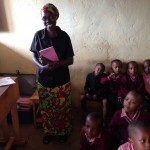Why Private Schools Matter in the Developing World
Natalie Hornsby is a member of Young Ambassadors for Opportunity.
All children must have access to primary education, as set forth by the UN Millennium Development Goals.
This is an incredible goal from a macro perspective—no one can argue against the value of educating children. But the unintended consequences of this universal policy have been devastating, as I recently witnessed in Rwanda.
Student-to-teacher ratios have shifted from roughly 30-to-1 to 80-to-1. School days were divided into two sessions (7 a.m.-12 p.m. and 1 p.m.-6 p.m.) to accommodate twice the number of students. Teacher salaries remained the same, despite the increased hours and workload. Good teachers left the field—and were replaced by former secondary students with minimal teacher training. Dropout rates between primary and secondary school levels have skyrocketed from 15 percent to 65 percent.
All of this has happened while the Rwandese government allocated 18 percent of its tax dollars to education—a phenomenal investment.
In the U.S., public education receives 5.5 percent of our tax dollars. But—and this is a huge difference—we have a massive tax base.
In developing countries, the tax base is often so limited that even if governments dedicate nearly 20 percent of their budget to education, they still cannot meet their populations’ needs.
This is why organizations like Opportunity International are so critical. We seek out ways to build and support education’s private sector. And it is working.
Because they are a paid enterprise, private schools are motivated to keep seats full and the quality of education high. No one will pay if the quality plummets. This, in turn, stimulates job creation as they hire more teachers to keep up with demand and maintain low student-to-teacher ratios. Owners of schools, through school proprietor loans, are encouraged to invest in infrastructure, adding desks, bathrooms and chalkboards.
When we look long term, hopefully this investment in private education will create an economically active generation that will increase the tax base and eventually elevate the state of public education.
Ready to help? Send a child to school for $1 a day.


Images of Natalie on her recent trip to Rwanda with Opportunity International. Learn more about our Insight Trips.